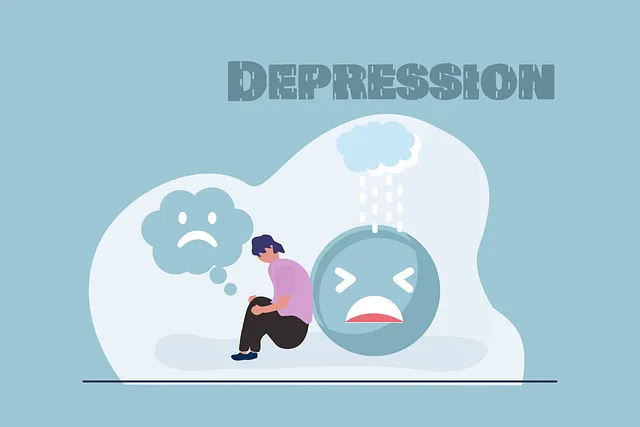Burnout among healthcare providers at Boulder Kaiser Permanente is addressed through proactive measures targeting stress reduction and mental well-being, as highlighted in positive Boulder Kaiser Permanente behavioral health services reviews. High-stress environments, heavy workloads, and emotional demands contribute to this issue. Effective countermeasures include Depression Prevention initiatives, mindfulness meditation, cognitive-behavioral therapy, and fostering open dialogue. Prioritizing self-care practices, such as regular mental wellness activities and setting work-life boundaries, is crucial for maintaining professional satisfaction and preventing burnout. Leadership's supportive approach, including open communication and recognition of staff contributions, enhances job satisfaction and team cohesion, ultimately leading to improved patient care.
In today’s demanding healthcare landscape, burnout among providers is a growing concern. This comprehensive guide explores effective strategies to prevent burnout, drawing insights from Boulder Kaiser Permanente Behavioral Health Services—a leading example of successful initiatives. We delve into the root causes and significant impact of provider exhaustion, offering evidence-based approaches for clinical settings. Through fostering supportive work environments and encouraging self-care, organizations can enhance professional well-being, ultimately improving patient outcomes. (Keywords: Boulder Kaiser Permanente behavioral health services reviews)
- Understanding Burnout Among Healthcare Providers: Causes and Impact
- Boulder Kaiser Permanente Behavioral Health Services: A Case Study
- Evidence-Based Strategies for Burnout Prevention in Clinical Settings
- Fostering a Supportive Work Environment: Roles of Leadership and Team Collaboration
- Self-Care Practices for Healthcare Professionals: Prioritizing Mental Well-being
Understanding Burnout Among Healthcare Providers: Causes and Impact

Burnout among healthcare providers is a growing concern, with high-stress environments and heavy workloads contributing to significant psychological and physical exhaustion. This phenomenon often manifests as emotional detachment from work, cynicism, and decreased job satisfaction. Studies have shown that burnout rates are alarmingly high within the medical profession, impacting not just individual well-being but also patient care and outcomes. A recent review of behavioral health services at Boulder Kaiser Permanente highlights these issues, underscoring the need for proactive measures to combat this growing crisis.
Causes of burnout vary widely but often include long hours, heavy patient loads, emotional demands, and a lack of control over work-related decisions. For healthcare providers, the constant exposure to traumatic situations, coupled with high expectations from patients, colleagues, and institutions, can lead to chronic stress and contribute to feelings of depression and anxiety. The impact extends beyond the individual, as burnout may result in decreased patient satisfaction and suboptimal clinical outcomes. Implementing strategies such as Depression Prevention initiatives, fostering Positive Thinking, and encouraging Mindfulness Meditation has been shown to offer effective countermeasures against these detrimental effects.
Boulder Kaiser Permanente Behavioral Health Services: A Case Study

Boulder Kaiser Permanente Behavioral Health Services stands as a shining example of implementing effective burnout prevention strategies within the healthcare sector. This case study highlights their commitment to supporting mental well-being among medical professionals, which is a critical aspect often overlooked in high-pressure environments. By integrating various initiatives, they’ve created a supportive ecosystem for healthcare providers.
The organization focuses on holistic approaches like cognitive-behavioral therapy and mindfulness practices, fostering an environment that encourages self-care. Their reviews consistently praise the accessibility and quality of these services. Moreover, Boulder Kaiser Permanente emphasizes the power of ‘Mind Over Matter’ principles, teaching practitioners techniques to manage stress and anxiety relief, ultimately enhancing their resilience against burnout. These strategies not only benefit individual healthcare providers but also contribute to improved patient outcomes in the long run.
Evidence-Based Strategies for Burnout Prevention in Clinical Settings

In clinical settings, evidence-based strategies for burnout prevention are essential to support healthcare providers’ well-being and enhance patient care. Organizations like Boulder Kaiser Permanente’s behavioral health services reviews highlight successful initiatives. One key approach is integrating structured self-awareness exercises into daily routines, enabling providers to recognize and manage their emotional states effectively. These practices foster a sense of agency and resilience against the demands of the job.
Additionally, implementing conflict resolution techniques within teams can significantly reduce burnout risk. Stress Management Workshops Organization (SMWO) programs that teach mindfulness, communication, and problem-solving skills have shown promising outcomes. By promoting a culture of open dialogue and emotional intelligence, healthcare facilities can create a supportive environment where providers feel valued and empowered, ultimately improving job satisfaction and reducing burnout rates.
Fostering a Supportive Work Environment: Roles of Leadership and Team Collaboration

At Boulder Kaiser Permanente behavioral health services, fostering a supportive work environment is pivotal in preventing burnout among healthcare providers. Leadership plays a crucial role by setting a positive tone through open communication strategies and recognizing staff contributions. When leaders prioritize mental wellness and actively involve teams in decision-making processes, it significantly enhances job satisfaction. This collaborative approach not only boosts morale but also encourages knowledge sharing and innovative problem-solving strategies within the team.
Effective collaboration among healthcare providers is another key component. Mentorship programs designed around mental health education can create a culture of support and empathy. By fostering strong interpersonal connections and encouraging peer-to-peer learning, teams become more cohesive and adept at handling challenging situations together. These collaborative efforts ultimately contribute to improved patient care and reduced stress levels for all involved.
Self-Care Practices for Healthcare Professionals: Prioritizing Mental Well-being

Healthcare professionals, like those at Boulder Kaiser Permanente behavioral health services reviews, often face high-stress situations and demanding work schedules, which can take a significant toll on their mental well-being. Self-care practices are essential strategies for burnout prevention among healthcare providers. Incorporating regular activities that promote mental wellness into daily routines can help manage stress and maintain professional satisfaction.
One effective approach is to prioritize self-reflection and mindfulness through therapy or mental wellness podcast series production. Engaging in open conversations with colleagues, participating in risk management planning for mental health professionals, and setting clear boundaries between work and personal life are additional strategies that foster a healthy work environment. These practices collectively contribute to the overall well-being of healthcare providers, ensuring they can continue to offer high-quality care without burning out.
Healthcare provider burnout is a growing concern, but by implementing evidence-based strategies, organizations like Boulder Kaiser Permanente Behavioral Health Services can foster supportive work environments. This case study highlights successful initiatives that combine clinical interventions, leadership support, and self-care practices. By prioritizing mental well-being and collaboration, healthcare facilities can prevent burnout, enhance patient care, and create a sustainable future for their professionals. Incorporating these strategies into clinical settings is key to addressing the impact of burnout among healthcare providers.






